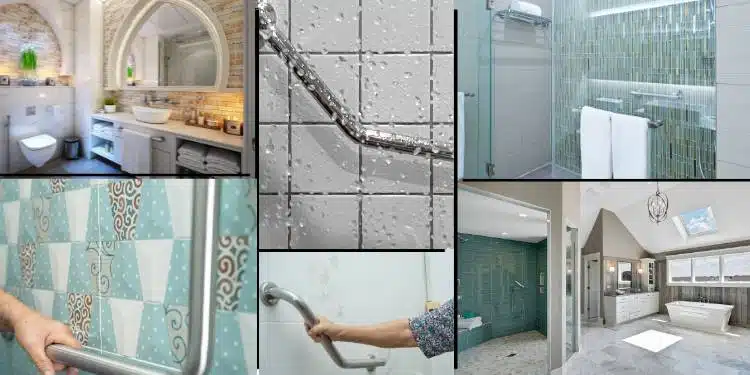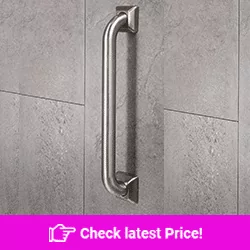by Leslie Farin
Did you know there are lots of decorative grab bars that don’t look like grab bars on the market these days? Many people tell me they don’t want to grab bars installed in their bathrooms because they look “institutional”. Or they say grab bars are for “old people”. These days, manufacturers make beautiful ones that are both useful and beautiful. And grab bars are not just for old people! Water and soap can make bathroom, tub, and shower floors slippery, so grab bars simply make good sense for everyone. This safety measure is not only important for older adults but also for younger people with temporary injuries or who rush around and don’t pay attention.
8 Reasons Grab Bars Are a Valuable Addition to Any Home
Grab bars can be a valuable addition to many homes, especially for individuals with mobility issues or anyone concerned about safety and accessibility. Here are some reasons why everyone should consider having grab bars in their home:
Fall Prevention:
Grab bars provide stability and support, reducing the risk of slips and falls, which is a leading cause of injury, especially among older adults. They offer a reliable handhold to help maintain balance when getting in and out of the shower or bathtub, or while navigating around the bathroom.
Accessibility:
Grab bars make it easier for individuals with disabilities or limited mobility to move around the home independently. They can be strategically placed near entryways, stairs, and other areas where assistance is needed.
Aging in Place:
As people age, the desire to live independently in their own homes often becomes more pronounced. Grab bars can make aging in place safer and more feasible, allowing individuals to maintain their autonomy.
Recovery from Surgery or Injury:
Grab bars are particularly useful for individuals recovering from surgery or injuries. They offer additional support when getting in and out of bed, chairs, or the shower, making the rehabilitation process smoother.
Peace of Mind:
Even if you don’t have mobility issues currently, having grab bars in place can provide peace of mind. Accidents can happen to anyone, and having these safety features in your home can help reduce the severity of injuries if a fall occurs.
Independence:
Grab bars can help individuals remain independent for longer, as they can perform daily activities with less assistance. This independence can have a positive impact on mental and emotional well-being.
Universal Design:
Integrating grab bars into your home’s design can be done in a way that is aesthetically pleasing and complements the overall decor. Modern grab bars come in various finishes and styles, making them blend with the interior design.
Resale Value:
Homes that are equipped with safety features like grab bars may be more attractive to potential buyers, especially those looking to accommodate older family members or individuals with mobility challenges.
When installing grab bars, it’s important to follow proper installation guidelines to ensure they are secure and provide the intended support. If you’re unsure about the best placement or installation, it’s a good idea to consult with a professional or contractor who has experience with accessibility modifications. Keep in mind that we do not recommend suction grab bars as they are not always reliable for safety.
The Beauty of Accessibility
You may not be familiar with the manufacturers that make grab bars that look nice, but sleek versions are available in a variety of finishes and sizes. They often double as towel bars or toilet paper holders. A decorative grab bar is no longer hard to find. Take a look at the list of our favorites below available at Amazon.
Our Favorite Grab Bars That Don’t Look Like Grab Bars
Take a look at these decorative grab bars that don’t look like grab bars!
Delta Faucet-Contemporary Grab Bar, Champagne Bronze
This contemporary 18-inch decorative grab bar in champagne makes a beautiful addition to your bathroom! With concealed mounting it extends 2 3/4 inches from the wall. (COMES IN 24″ TOO)
 This safe and secure bathroom grab bar supports up to 250 lbs. (supports up to 500 lbs. when installed using SecureMounts- not included). It’s easy to install and not only provides peace of mind in the shower, but the added shelf comes in handy for soap, shampoo, or whatever. The versatile design in chrome works with any decorating style.
This safe and secure bathroom grab bar supports up to 250 lbs. (supports up to 500 lbs. when installed using SecureMounts- not included). It’s easy to install and not only provides peace of mind in the shower, but the added shelf comes in handy for soap, shampoo, or whatever. The versatile design in chrome works with any decorating style.
Bathware Wave-Shaped Grab Bar
This unique wave-shaped decorative grab bar provides multi-level support. It’s functional, safe, and on-trend. It’s the perfect solution for a modern bathroom!
Delta Traditional Grab Bar

This decorative grab bar/towel bar, forged with the finest die-cast zinc and rust-resistant stainless steel, provides quality and strength you can see and feel. I love the combination of a grab bar and a towel bar – these grab bars don’t look like grab bars!
Delta Contemporary Combination Towel and Assist Bar
 Fabulous function meets awesome contemporary decor! This streamlined design installs easily and provides support for more than 250 lbs.
Fabulous function meets awesome contemporary decor! This streamlined design installs easily and provides support for more than 250 lbs.
Delta Dual Purpose Tissue Holder and Assist Bar
Another unique and contemporary product from Delta! This 6-inch-long tissue holder also functions as an assist bar. With a pivoting arm, it extends 4 1/2 inches from the wall. Sleek and beautiful!
Why Install Grab Bars Before You Need Them?
The above grab bars that look nice are just a few examples – there are many others! If you plan to renovate or build a new home, it makes sense to integrate some sturdy grab bars that don’t look like grab bars into the design. You may think you won’t need these support bars for many years – and that may be true – but you never know. Waiting until you need them costs a lot more money as you need to add support behind the walls for safety. Many people put up tension grab bars at that point to save money, something we discourage. They are not nearly as reliable or safe.
I have a friend in his early sixties who renovated his master bathroom recently. One day, when discussing his plans, I suggested he think about adding a beautiful grab bar or two while they were pulling down tile anyway. He let me know he was not at all interested and that it would be a long time before he needed them, if ever. This is delusional thinking; we all age and need to take more safety precautions. I understand no one likes to think about growing old, but it’s important. And if you think about it now, you don’t need to think about it later. The safety measures are already in place!
Grab Bars Are for Everyone
Grab bars aren’t just safety devices for hospitals and public restrooms. Beautifully designed grab bars that don’t look like grab bars blend seamlessly into your design. Strategically placed and solidly anchored grab bars can mean the difference between a relaxing bath and a trip to the emergency room. For all ages.
FAQs About Decorative Grab Bars
Below are some frequently asked questions about decorative grab bars we hear from our readers.
What are decorative grab bars?
Decorative grab bars are safety devices designed to assist people with stability and support, especially in bathrooms and other areas where slipping or falling is a concern. Unlike traditional grab bars, decorative grab bars are aesthetically pleasing and blend in with the surrounding decor.
How do decorative grab bars differ from regular grab bars?
Regular grab bars are usually plain and utilitarian in appearance, designed solely for functionality. Decorative grab bars, on the other hand, are created with a focus on design and style, often resembling towel racks or other bathroom fixtures to seamlessly integrate into the overall decor.
What materials are decorative grab bars typically made of?
Decorative grab bars are commonly made from durable materials such as stainless steel, brass, or aluminum. Some may also have decorative finishes, such as brushed nickel, chrome, or bronze, to match the bathroom’s existing fixtures.
Are decorative grab bars as sturdy as regular grab bars?
Yes, decorative grab bars are engineered to be just as sturdy and functional as regular grab bars. They are designed to meet safety standards and provide reliable support for users.
Can decorative grab bars be installed in any area of the home?
While decorative grab bars are most commonly used in bathrooms, they can be installed in various areas throughout the home where extra support is needed. This includes hallways, stairways, and bedrooms.
Can decorative grab bars support the weight of a person?
Yes, decorative grab bars are designed to support the weight of a person when installed correctly and according to the manufacturer’s guidelines. They are rigorously tested to ensure they meet safety standards.
Are decorative grab bars easy to install?
Decorative grab bars can be relatively easy to install, especially if you have some DIY experience. However, it’s recommended to hire a professional if you are unsure about the installation process to ensure the grab bars are securely mounted.
Can decorative grab bars be used in commercial spaces or public restrooms?
Yes, decorative grab bars can be used in commercial spaces and public restrooms. They offer the same level of support and safety while enhancing the overall decor of the space.
Where can I purchase decorative grab bars?
Decorative grab bars can be found at home improvement stores, specialty bathroom fixture retailers, and online stores. Be sure to choose grab bars that are compliant with safety standards and match the style and decor of your home.
The Evolution of Grab Bars
The history of grab bars is closely tied to the evolution of architecture, design, and accessibility considerations. You’ll be a big hit at your next cocktail party with these interesting little tidbits!
Ancient and Medieval Periods
While the concept of grab bars, as we know them today, didn’t exist, historical records suggest that various civilizations and cultures recognized the need for supportive structures in buildings. Ancient Roman baths, for instance, often had built-in stone benches and handrails along the walls to aid bathers in moving around safely. In medieval times, castle dungeons and chambers sometimes featured rudimentary handholds to assist occupants in navigating steep stairs and uneven terrain.
Renaissance and Enlightenment
As architectural techniques advanced during the Renaissance and Enlightenment periods, palaces, public buildings, and even some homes began incorporating more thoughtful design elements for accessibility. While these designs were not as systematic or standardized as today’s, they marked an early recognition of the need for supportive features.
Industrial Revolution
The Industrial Revolution brought about significant advancements in construction and design, including the development of more standardized building practices. However, it wasn’t until the 20th century that the concept of grab bars as we understand them began to emerge.
20th Century
The 20th century saw significant progress in the field of accessibility and disability rights. The concept of installing grab bars as a safety measure gained traction, particularly in hospitals and healthcare settings. This was driven in part by the needs of injured soldiers returning from World War I and World War II.
Late 20th Century
With the establishment of disability rights and the growing awareness of the needs of elderly and mobility-impaired individuals, grab bars began to appear more commonly in public buildings, particularly in restrooms and other areas where individuals might require support. However, they were often more functional than aesthetically pleasing at this stage.
ADA and Modern Accessibility Standards
The Americans with Disabilities Act (ADA) of 1990 marked a significant milestone in accessibility rights and standards. The ADA included guidelines for the installation of grab bars, to ensure people know how to install them at appropriate heights and distances to provide maximum support. This legal framework spurred the adoption of grab bars in a wider range of settings, including private homes, hotels, restaurants, and more.
Contemporary Design and Innovation
In recent decades, designers and manufacturers focused on combining functionality with aesthetics. This has led to the development of grab bars that blend seamlessly with bathroom decor and even mimic other accessories, making them less conspicuous while maintaining their support functions. Additionally, the use of various materials and finishes has increased, allowing for greater customization and integration into different design styles.
Today, grab bars are an essential element in creating accessible and safe environments for people with various mobility needs, and they continue to evolve to meet both functional and design requirements.
Learn more about aging in place and grab bars:
- 18 Beautiful Grab Bars (Not Your Grandma’s Grab Bar)
- 4 Most Commonly Googled Questions About Grab Bars
- Every Towel Bar Should Be a Grab Bar!
- Planning to age in place? Consider Universal Design Concepts

















